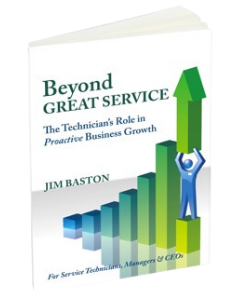 How is your business really doing was the subject of my last blog. In the article, I discussed the challenge of determining if your service technicians are really delivering a Proactive Service® experience by bringing ideas to your customers that will help them be better off. If you recall, I suggested that you consider two questions to ask your customers:
How is your business really doing was the subject of my last blog. In the article, I discussed the challenge of determining if your service technicians are really delivering a Proactive Service® experience by bringing ideas to your customers that will help them be better off. If you recall, I suggested that you consider two questions to ask your customers:
1. “Do our technicians bring you ideas that help you operate more effectively?”
2. “Do you feel that you are better off for having known us?”
If you are interested in tracking your progress over time or compare branch operations for these questions, for example, I would like to suggest a scoring key that will help you. In his article in the Harvard Business Review, “The One Number You Need to Grow”¹ , Frederick Reichheld introduces us to his research into the one question that he found was a good predictor of customer loyalty and growth. The question was “How likely would you recommend [company X] to a friend or colleague?” He introduces a scoring key that provides a “net promoter” score. The “net promoter” component comes from the fact that Reichheld’s scoring key considers not only the percentage of responders who rated the company highly (promoters) and who would likely promote the company (i.e. recommend to friends and colleagues), but also the percentage of responders who would rate the company poorly and likely speak negatively about their experience (detractors). By subtracting the percentage of “detractors” from the percentage of “promoters”, Reichheld ends up with a “net promoter score” that can be compared from branch to branch, period to period, etc. Read more

 Whenever I speak on the subject of Proactive Service® , invariably someone will ask me how do we really know how we are doing? I mention that there are several measures to consider. Higher sales and revenues, increased customer satisfaction and improved levels of customer retention are just a few to consider. However, if you really want to know how you are doing, here are 2 questions to ask your customers through your surveys and during face-to-face visits:
Whenever I speak on the subject of Proactive Service® , invariably someone will ask me how do we really know how we are doing? I mention that there are several measures to consider. Higher sales and revenues, increased customer satisfaction and improved levels of customer retention are just a few to consider. However, if you really want to know how you are doing, here are 2 questions to ask your customers through your surveys and during face-to-face visits: “I’ll know it when I see it” is a phrase often used to describe a thing or situation which is typically subjective in nature and cannot be clearly defined. However, when it comes to empathy perhaps a better way to describe it is “I’ll know it when I feel it”.
“I’ll know it when I see it” is a phrase often used to describe a thing or situation which is typically subjective in nature and cannot be clearly defined. However, when it comes to empathy perhaps a better way to describe it is “I’ll know it when I feel it”. Don’t make promises you can’t keep was one of the common maxims in our household when I was growing up. Wise advice. I was reminded of the importance of this message just last week and that sometimes, it is better to turn business away rather than disappoint. Have you found that you sometimes take on work or make commitments for which you have a low likelihood of fulfilling?
Don’t make promises you can’t keep was one of the common maxims in our household when I was growing up. Wise advice. I was reminded of the importance of this message just last week and that sometimes, it is better to turn business away rather than disappoint. Have you found that you sometimes take on work or make commitments for which you have a low likelihood of fulfilling? In our programs, we dedicate a portion of our time to presenting an effective technique for taking the stress out of challenging situations. We discuss the impact of stress in emotional situations and the important role that we play as technicians to reduce it. The power of this technique was brought home to me last week.
In our programs, we dedicate a portion of our time to presenting an effective technique for taking the stress out of challenging situations. We discuss the impact of stress in emotional situations and the important role that we play as technicians to reduce it. The power of this technique was brought home to me last week. “Are your customers better off having known you?” This is a question we ask in our
“Are your customers better off having known you?” This is a question we ask in our  I was reminded this morning that it doesn’t take much for a service provider to stand out from the crowd. There is a lot of focus on enhancing the customer experience and creating strong relationships that clearly differentiate you from your competition. My experience with my mobile service provider was a perfect case in point.
I was reminded this morning that it doesn’t take much for a service provider to stand out from the crowd. There is a lot of focus on enhancing the customer experience and creating strong relationships that clearly differentiate you from your competition. My experience with my mobile service provider was a perfect case in point. “Money isn’t everything, … but it’s way ahead of whatever is in second place!” is a quote that is connected to some of the happiest times of my life. Little did I know at the time that, with a slight modification of a single word, it could hold an important message for service companies.
“Money isn’t everything, … but it’s way ahead of whatever is in second place!” is a quote that is connected to some of the happiest times of my life. Little did I know at the time that, with a slight modification of a single word, it could hold an important message for service companies. I received an important reminder about giving customers our hearts as well and our heads. I was having lunch with a good friend and client last week and we got onto the topic of the benefits and pitfalls of engaging technicians in business development activities. In particularly we were talking about how sales people can use the proactive promotion of services by their technicians to differentiate themselves when selling contract services. I mentioned that while most companies give their customers their hands (i.e. do good work), proactive service companies provide customers with their heads as well. By looking out for their customers and making helpful suggestions to allow them to be more effective at operating their facilities, they are providing the highest level of service.
I received an important reminder about giving customers our hearts as well and our heads. I was having lunch with a good friend and client last week and we got onto the topic of the benefits and pitfalls of engaging technicians in business development activities. In particularly we were talking about how sales people can use the proactive promotion of services by their technicians to differentiate themselves when selling contract services. I mentioned that while most companies give their customers their hands (i.e. do good work), proactive service companies provide customers with their heads as well. By looking out for their customers and making helpful suggestions to allow them to be more effective at operating their facilities, they are providing the highest level of service. It was a rude awakening to a valuable reminder. Bang! I was in Calgary to present a seminar on communicating value. I squinted at the hotel alarm clock. Not quite five. Bang! There it was again. Another insensitive guest on their way to an early start I surmised and closed my eyes.
It was a rude awakening to a valuable reminder. Bang! I was in Calgary to present a seminar on communicating value. I squinted at the hotel alarm clock. Not quite five. Bang! There it was again. Another insensitive guest on their way to an early start I surmised and closed my eyes.

